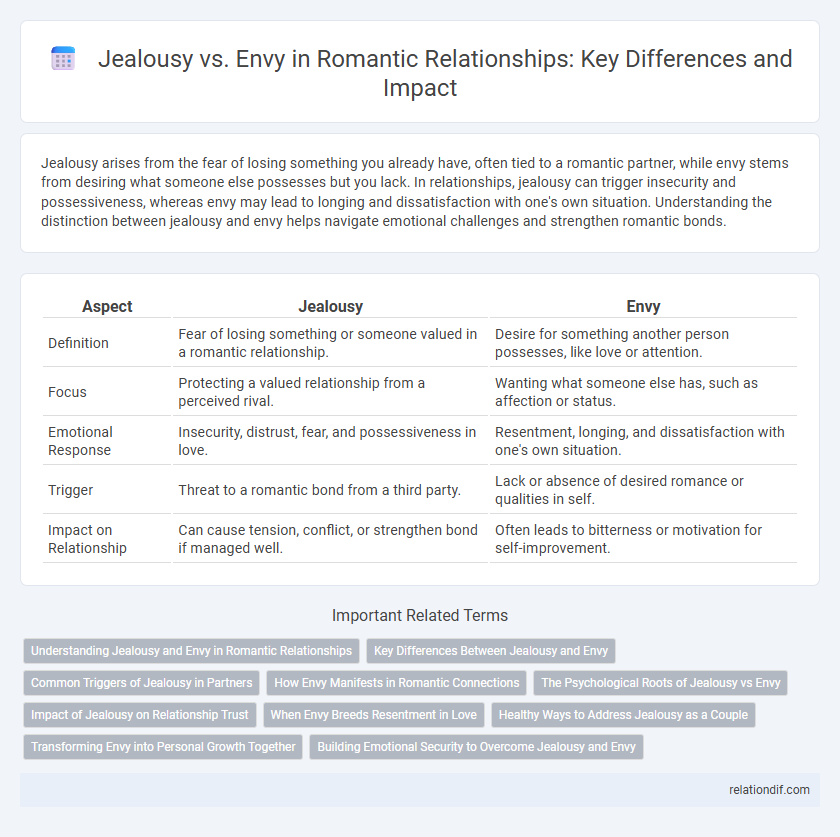Jealousy arises from the fear of losing something you already have, often tied to a romantic partner, while envy stems from desiring what someone else possesses but you lack. In relationships, jealousy can trigger insecurity and possessiveness, whereas envy may lead to longing and dissatisfaction with one's own situation. Understanding the distinction between jealousy and envy helps navigate emotional challenges and strengthen romantic bonds.
Table of Comparison
| Aspect | Jealousy | Envy |
|---|---|---|
| Definition | Fear of losing something or someone valued in a romantic relationship. | Desire for something another person possesses, like love or attention. |
| Focus | Protecting a valued relationship from a perceived rival. | Wanting what someone else has, such as affection or status. |
| Emotional Response | Insecurity, distrust, fear, and possessiveness in love. | Resentment, longing, and dissatisfaction with one's own situation. |
| Trigger | Threat to a romantic bond from a third party. | Lack or absence of desired romance or qualities in self. |
| Impact on Relationship | Can cause tension, conflict, or strengthen bond if managed well. | Often leads to bitterness or motivation for self-improvement. |
Understanding Jealousy and Envy in Romantic Relationships
Jealousy in romantic relationships arises from the fear of losing a valued partner to a perceived rival, often triggering insecurity and protective behaviors. Envy involves longing for qualities or possessions that the partner or others have, which can create feelings of inadequacy or resentment. Understanding the emotional triggers behind jealousy and envy helps couples foster trust, improve communication, and build stronger emotional bonds.
Key Differences Between Jealousy and Envy
Jealousy involves a fear of losing something you already possess, often triggered by the threat of a rival in romantic relationships, while envy is the desire for something someone else has that you lack. In romance, jealousy typically revolves around a partner's attention or affection, whereas envy emerges from coveting the qualities or possessions of another individual. Understanding these emotional distinctions aids in addressing insecurities and enhancing communication between partners.
Common Triggers of Jealousy in Partners
Common triggers of jealousy in romantic partners include perceived threats from rivals, such as flirting or emotional intimacy with others, which can undermine trust and security in the relationship. Insecurity about one's own desirability or fear of abandonment often intensifies jealous feelings, leading to heightened vigilance and emotional distress. Communication breakdowns and past experiences of betrayal also exacerbate jealousy, making it critical to address these issues for relationship stability.
How Envy Manifests in Romantic Connections
Envy in romantic connections often surfaces as a yearning for qualities or attention that another partner receives, fueling insecurity and dissatisfaction. This emotion can lead to subtle comparisons and an unspoken rivalry that undermines trust and intimacy. Recognizing envy helps couples address underlying needs and strengthen emotional bonds through open communication and empathy.
The Psychological Roots of Jealousy vs Envy
Jealousy in romance often stems from fear of losing a valued partner to a perceived rival, triggering complex emotional responses tied to attachment and self-esteem. Envy arises from wanting what another person has, such as affection or intimacy, reflecting feelings of inadequacy and desire for comparison-based validation. Both emotions activate neural pathways related to social pain but differ as jealousy involves triadic relationships, while envy centers on dyadic comparisons.
Impact of Jealousy on Relationship Trust
Jealousy in romantic relationships often undermines trust by fostering insecurity and suspicion between partners. Persistent jealousy can lead to frequent misunderstandings, emotional distance, and reduced communication, which erodes the foundation of mutual trust. Managing jealousy effectively requires open dialogue and reassurance to maintain a healthy and secure bond.
When Envy Breeds Resentment in Love
Envy in romantic relationships often stems from a desire to possess what a partner has or represents, creating feelings of inadequacy and resentment. Unlike jealousy, which involves fear of losing a valued connection to a rival, envy targets the partner's qualities or successes, leading to bitterness. Persistent envy undermines trust and emotional intimacy, making it crucial to address these feelings for a healthy, loving bond.
Healthy Ways to Address Jealousy as a Couple
Couples can foster trust and emotional security by openly communicating their feelings of jealousy, which reduces misunderstandings and strengthens the bond. Establishing clear boundaries and respecting each partner's individuality helps prevent jealousy from escalating into resentment or control issues. Practicing empathy and focusing on gratitude for the relationship encourages positive connections, enabling partners to address jealousy healthily and collaboratively.
Transforming Envy into Personal Growth Together
Jealousy and envy often intertwine in romantic relationships, but transforming envy into personal growth fosters deeper connection and self-awareness. Embracing vulnerability and open communication helps partners recognize insecurities and channel feelings into mutual support and motivation. Cultivating empathy enables couples to grow individually and strengthen their bond, turning envy from a source of division into an opportunity for shared development.
Building Emotional Security to Overcome Jealousy and Envy
Building emotional security is essential for overcoming jealousy and envy in romantic relationships, as it fosters trust and self-confidence between partners. Open communication and consistent reassurance help partners feel valued, reducing insecurities that often trigger these emotions. Developing emotional resilience through mindfulness and self-awareness promotes a healthy connection by allowing individuals to address feelings constructively rather than react impulsively.
Jealousy vs Envy Infographic

 relationdif.com
relationdif.com